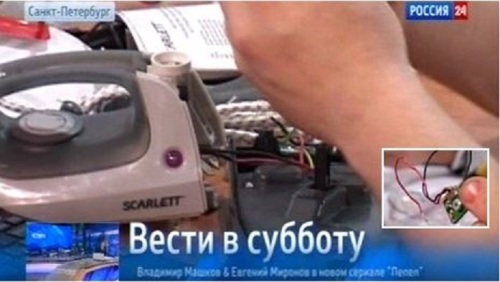Made-in-China home appliances contain spy chips
Those cheap made-in-China home appliances you bought from Walmart, like electric irons and tea kettles, may contain computer chips that will infect your computer with viruses.The BBC News reports that Rossiya 24, the Russian state-owned TV channel, showed footage of a technician opening up an iron included in a batch of Chinese imports to find a “spy chip” with “a little microphone”.

The hidden spy chips are mostly being used to spread viruses, by connecting to any computer within a 656 ft radius which uses unprotected Wi-Fi networks. Other products found to have rogue components reportedly included mobile phones and car dashboard cameras.
The TV report quoted one customs brokerage professional as saying the hidden chips had been used to infiltrate company networks, sending out spam without administrators’ knowledge.
Erik Sherman reports for CBSNews, Nov. 1, 2013, that according to tech blog The Register, spy chips were also found in kettles.
Sherman writes:
[...] this is hardly the first time Chinese products were reported infested with ways for someone to break into systems. There was the report last year that a researcher found a so-called back door in a military-grade computer chip, meaning that someone could, from anywhere, get ready access to the chip and, through it, connected systems.
If military-grade products can be compromised, consumer products can be as well. Former U.S. counter-terrorism head Richard Clarke says thatany electronics product made in China is potentially vulnerable.Many parts are counterfeits with no control by manufacturers over how they’re designed and built, and Clarke wonders whether “real” parts from China could also be compromised. (Other security researchers disputedwhether the backdoors were added by China or even intentionally malicious. Backdoors are sometimes added by manufacturers as mechanisms for testing and support, although they still add a vulnerability.)
There have been cases where suspected hacking from China paralleled Chinese military interests, again raising suspicion that the government is either directly or indirectly involved with both military and industrial espionage.
But given the vast number of products made in China and the increasing percentage of items that included chips of some sort, the potential for problems could be disturbing. One step, as CBS MoneyWatch’s Dave Johnson recently noted, is to turn encryption on for all your wireless networks. That locks out any device that doesn’t know the password.
Of course, that wouldn’t necessarily help block a new computer “super virus“ that seems to infect computers even without a network connection, according to an Ars Technica report. The original discovery was by a highly-respected security researcher and no one is sure how it works, other than possibly using high-frequency sound emitted by the speaker of an infected computer and received by the microphone of the target. Could an infected household appliance include a tiny speaker that might broadcast such a sound? Certainly.
H/t CODA’s Sol Sanders
No comments:
Post a Comment